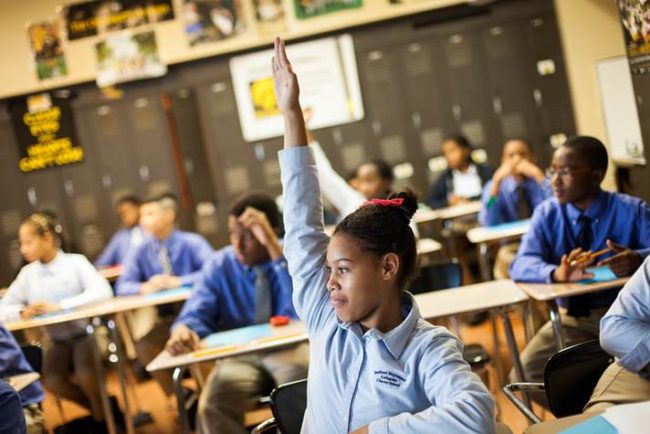07.02.18England Reflections 3: Not Every Student Tells You They Have Something to Say with a Hand Up

Not every student with something to say tells you like this…
Some teachers are inclined to think of Cold Call as something that involves ‘picking on’ kids–it involves a teacher ‘forcing’ students to talk when the kids don’t want to talk.
I don’t think that’s true.
Ask a question of a room full of people and most (at least many) of them are having productive useful thoughts in response–if they aren’t, the last thing you should be doing is leaving well-enough alone.
Ask a question of a room full of people and there is almost always at least one looking at you as if to say, “It would be ok if you called on me now.” Or maybe even, “Please call on me.”
People often want to participate. They are often more willing to participate than they are willing to raise their hand. People are often mixed in their feelings–part of them wants to talk but part of them is afraid or reluctant or hesitant. They are reacting to conflicting social signals. They are discovering that they can.
A Cold Call can just as easily be an invitation; an opportunity.
At our first workshop at Ivybridge Community College in England last week, we brainstormed reasons why a student might want to answer but not raise their hand. We hit on a lot of answers that frequently come up in such brainstorms–kids might be worried about social perception or peer pressure. They might not be sure of their answer. They might wonder if they are talking too much.
But one of our participants said that being Cold Call absolved students of appearing smug and proud. To raise your hand is most often to say–I know this. And many students are reluctant to do that. They have an admirable humility.
But if you are called on without your hand in the air you make no such pretenses. You have been asked to do your best and so you do so. In many cases you can offer the sort of conjecture that is as much question as answer. These can be immensely valuable–to peer and to self.
Being Cold Called, in other words, allows students to share ideas at lower risk–“I hadn’t planned to say this, but here’s what I am thinking.” It can release students from perceived social pressure too.
She asked me to means you can say what you are thinking regardless of any social pressure about when and how and how often to raise your hand.
And that, I think is why there is always that kid (or adult!) who is looking at you with “Call on me now’ written on his or her face. You are their route around the social barriers. They want to speak and share an idea. To Cold Call them is so often inclusive. A way in, especially for students who are most likely to feel or be subjected to to pressure not to talk. Kids on the margins, say. Like girls in certain communities or like the kids who face more pedestrian barriers–I’m not that kid–to believing they can be students.

I am a fan of TLAC and have delivered training on some of your strategies. I have found that many teachers’ resistance is the name, ‘Cold Calling’. This phrase has such negative connotations (in the UK, anyway) of being hassled by unwanted phone calls so I’ve found that the name of the strategy is automatically received with derision – the idea of students being ‘picked on’ and hassled for answers.
When using the AfL term ‘no hands up’, (which is, admittedly, a slightly different strategy) it’s not met with such resistance.
I wonder if this is a UK issue? Does the term ‘cold calling’ have such negative connotations in the US?
A little. my team and I try to help teachers see it as a positive and spend a lot of time in training helping teachers to make cold call feel like an invitation to a real conversation. It’s still imperfect. One challenge with hands down as you point out is that we think it’s slightly different from cold call… i could still cold call even if some students were raising their hands. that said of course i am happy for you to call it what works best in your setting…